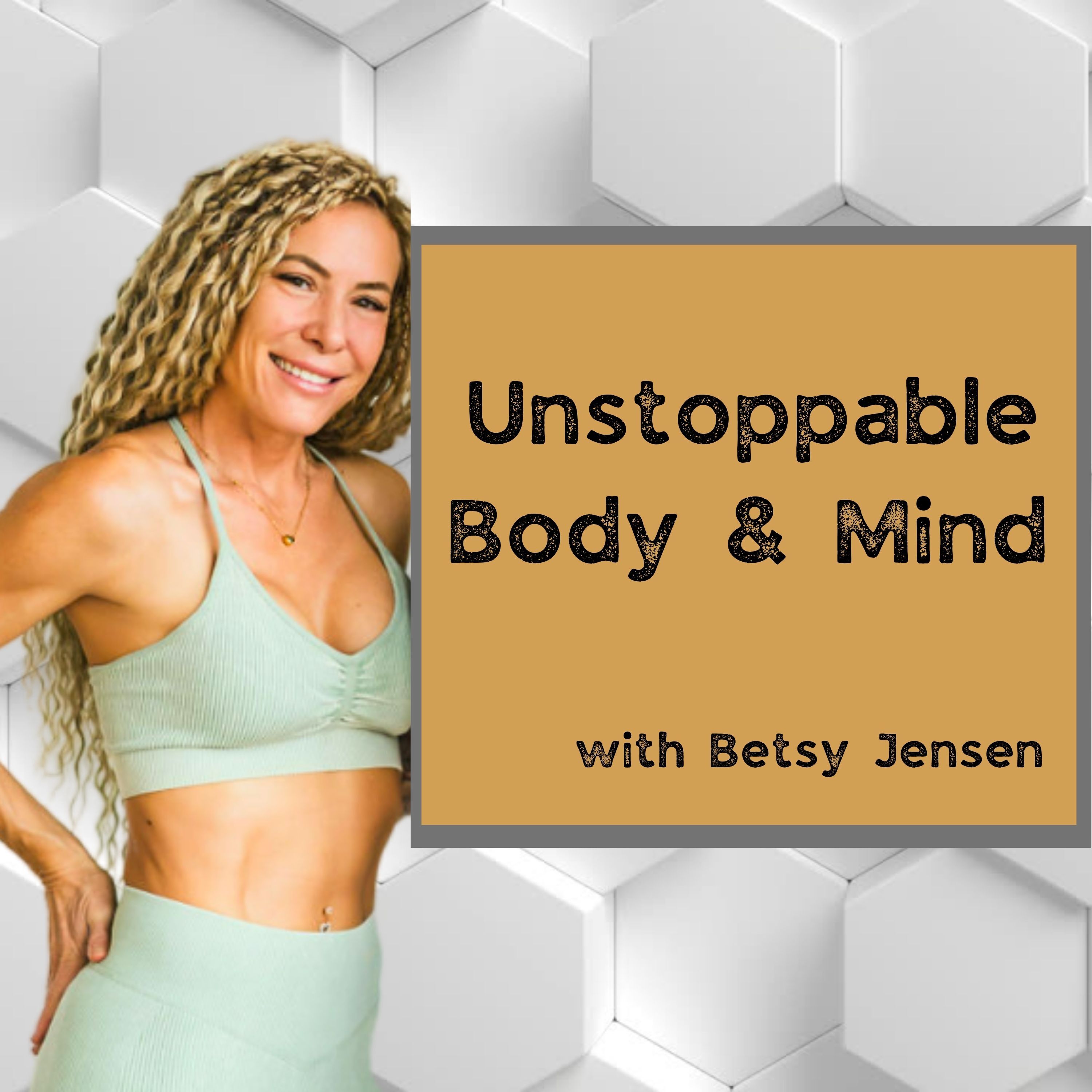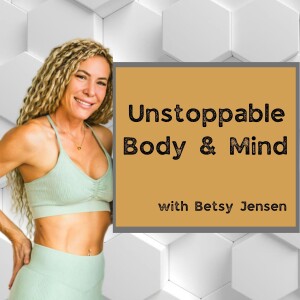
145.9K
Downloads
139
Episodes
Science based strategies for the brain and nervous system, and thought work tools from life coaching to help you feel better in your body at any age!
Science based strategies for the brain and nervous system, and thought work tools from life coaching to help you feel better in your body at any age!
Episodes

Thursday Oct 13, 2022
Episode #104-Predictive Coding
Thursday Oct 13, 2022
Thursday Oct 13, 2022
Predictive coding is like a brain's subconscious shortcut.
Predictive coding is the #1 reason for chronic pain symptoms. Especially for people who tell me they feel calm, but their pain is related to a movement, food, time of the month, etc.
I give you a few examples of how predictive coding works in our bodies to produce symptoms, and how it can be reversed! Be sure and listen to find out more
Want help with applying this into your life? Check out Alignment Academy (my group coaching membership). Click here:
https://betsy-jensen.mykajabi.com/alignment-academy-membership
For fresh content on healing chronic pain or disease, follow Betsy
on Instagram https://www.instagram.com/bodyandmindlifecoach/
Youtube https://www.youtube.com/channel/UCvXZSYYGL2cfJl-oEOzqspA
Website https://bodyandmindlifecoach.com
*Free Nervous System Modules- 4 free videos explaining the nervous system, how it affects your health, and how to regulate it https://view.flodesk.com/pages/620ffa96e0eda1a0d870b5a6
*Curable App- 6 Weeks Free with this code http://www.curable.com/betsyjensen
If you like this podcast, please give it a five star rating and review on Itunes https://podcasts.apple.com/us/podcast/the-unstoppable-body-and-minds-podcast/id1493360543
Transcript-Automatically Generated:
This is Betsy Jensen, and you are listening to Unstoppable Body and Mind, episode 104, Predictive Coding.
In this podcast, we learn to upgrade our brain and understand the power of our thoughts, to heal and to create the results we want in our life. Become the person in control of your healing and make peace with your life. Become unstoppable body and mind.
Hello, my loves. Today's topic is predictive coding, which I have to say is probably the number one way that people keep themselves in chronic pain, is by looking at what I would call predictive coding, the way that the brain predicts what's going to happen and actually generates pain based on beliefs. When pain comes and goes, and it seems related to stress, it's very easy to see, oh, there's an emotional component.
But sometimes people will tell me every time I bend over, I feel this pain, or it's just when I'm typing, or it's a certain food that I've eaten, or when the weather changes or bright lights, or it's that time of the month. And they tell me about this predictive pattern that they have seen for months and maybe even years. But what they found in neuroscience is that our brain is very efficient.
There are many things that we subconsciously assume that change our body. Think of the example of food poisoning. You could have food that you ingested and then you got very, very sick.
So in the future, just thinking of that food has a physiological response on your body. Your stomach may tighten up. If you actually tried to eat that food, you might physically not be able to even swallow it, or you might get sick.
Your brain and your body want you to remember that time that felt so horrible. So any traces of that now, your brain can actually create, recreate some of those symptoms. When a car next to you moves, you may feel your body feel like it's moving when the car next to you moves.
Nothing actually moved, but because of the environment and what your brain has put together as this is what this means, your brain creates a sensation in your body. What they found in neuroscience is that our brain is very efficient. So it can very easily form some subconscious thoughts about what happened and what is going on.
And then our reticular activating system, this part of our brain that's designed to back up our beliefs will actually cause us to only find those things in reality that back up our beliefs and remember those and forget the rest. So an example is someone might tell me that their back pain is related to their periods. And every time they have their period right before they have back pain, for example.
And then when I question them a little more, sometimes they'll say, yeah, when I was on vacation, that one time I didn't have it. Or out of the last four months, three out of the times I had it and one I didn't. And that is actually showing that it is not something structural, right?
If it was something structural, it would happen every single time. And so just by that alone, you can see the brain tends to kind of overgeneralize to see the patterns it's familiar with. It happens at this subconscious level.
So we're not even consciously aware of it, but it's like Pavlov's dogs. When he would ring a bell repeatedly right before he gave them food, they came to associate the bell with food, and physiologically their body changed. So if I injured my back at one point and bending over hurt, then my brain would associate that bending with pain.
And there are a lot of people that would verify that, yes, bending, there's these structural things that happen, and so that increases your pain, and your back has this damage. So there are a lot of fearful things that you could also hear about bending. So long after the injury is healed, typically three to six months is the longest it takes an injury to heal.
And after that time, it's fair to assume that there are a lot of predictive coding pathways that your brain has generated. Right? It wants to be efficient.
Your brain saves time. It's like a shortcut by having this predictive coding. So after your injury has healed, you may still feel that pain with bending forward.
And if you felt that pain for 10 years, every time you bend forward, you have a lot of evidence gathered of times that you've bent forward and it's hurt. And again, your brain might have even had sometimes that it hadn't hurt, but it will quickly not remember them or not even realize that they ever happened. We know our bodies will subconsciously prepare for movement.
For example, if we're going to go from sitting to standing, our blood vessels constrict before we go to stand up so that our blood pressure regulates. So the same thing can happen, for example, with our muscles, when we have a pattern of, I've had this before myself, that's how I know, when my back has been very tight, and then I know, you know, with a certain movement, that that's when I feel pain, I prepare to go from sitting to standing, and I actually, before I even do it, feel my back tighten up and then go to standing. So it's like the brain believes there's this area to protect, it has to tighten up, and in doing that, it is actually causing pain.
It's causing the pain that I feel that reinforces that there is damage that it needs to tighten up to protect. One example of predictive coding in the body that happens physiologically is that when we drink water, we stop feeling thirsty. Now, it would take 20 minutes for ourselves to actually register that the hydration level has changed.
But our brain through experience and through what people have told us is that when we have that thirst signal, that when we drink water, that will solve it. So instead of drinking water for 20 whole minutes until we stop feeling thirsty, we actually drink water, stop feeling thirsty, and then the body goes on doing what it needs to because that task is taken care of. You could think of predictive coding and the reticular activating system, like when you buy a new car and all of a sudden, you notice all the same cars that are out there that are like yours that you had never noticed before.
So this can happen with pain, with these patterns. I know for me, I associated drinking coffee with my stomach hurting or drinking caffeine with urinary urgency. But once I started questioning that maybe this is just some predictive coding that my brain is using as a shortcut, I started to see examples of when it wasn't true.
And this is what we do when we think there might be some predictive coding. We want to really lean into detective or the opposite. So this is where you look for any examples of how your belief is not true.
So if you say, you know, every time I drive for more than an hour, my back hurts, but then you notice, you can sit in the passenger seat for two hours, and your back doesn't hurt. Or you notice that you can sit in the movie seats for two hours, and your back doesn't hurt. So you start to look for, like a detective, you know, making its strongest case.
You want to look for every shred of evidence, every time that you feel better than you think you're going to, any time that it possibly might be a different pattern than what you expect. Doing this does two things. First of all, you start building this effort and building this evidence for yourself that you can look back on in times of doubt.
You could even write it down, get a notebook and be a detective. The other thing it does is it shifts your brain, that reticular activating system that is used to being focused on looking for pain and what creates pain, it shifts it to looking for when you're feeling better, things that feel good when you're distracted. So shifting your focus there, it's like a gratitude journal.
When you start focusing on just three things you're grateful for each day, by the end of 30 days, you have a whole shift in how you see the world and your happiness level, because you start to look for things to be grateful for each day, and then that becomes the habit of your brain, the habit of that way of thinking. So looking for, ah, that's interesting. This feels slightly better.
Ah, when I was distracted, that's usually when it happens. When I was distracted, that felt better. And when you notice pain, notice those stories that you have around your pain.
There have been so many stories of people that have evidence, they have medical evidence of this research study or this person, what they said, that this causes their pain. And when they start believing differently, I've experienced it myself with foods, with exercises, with movements. When you start to believe differently, amazing things can happen.
So just have some curiosity. I urge you to be that detective for the opposite. And notice any times you see yourself getting stuck on some kind of belief that you just believe is true for you, it might just be predictive coding.
All right, thanks you guys. Have a good week.
Thank you so much for listening. I hope you learned a little bit about your brain today. That helps you in your life, like it helped me.
Please be sure and subscribe and leave a review. And of course, be sure and share this podcast with someone you know that wants an unstoppable body and mind.

1 years ago
Is it possible to cure ulcerative colitis?